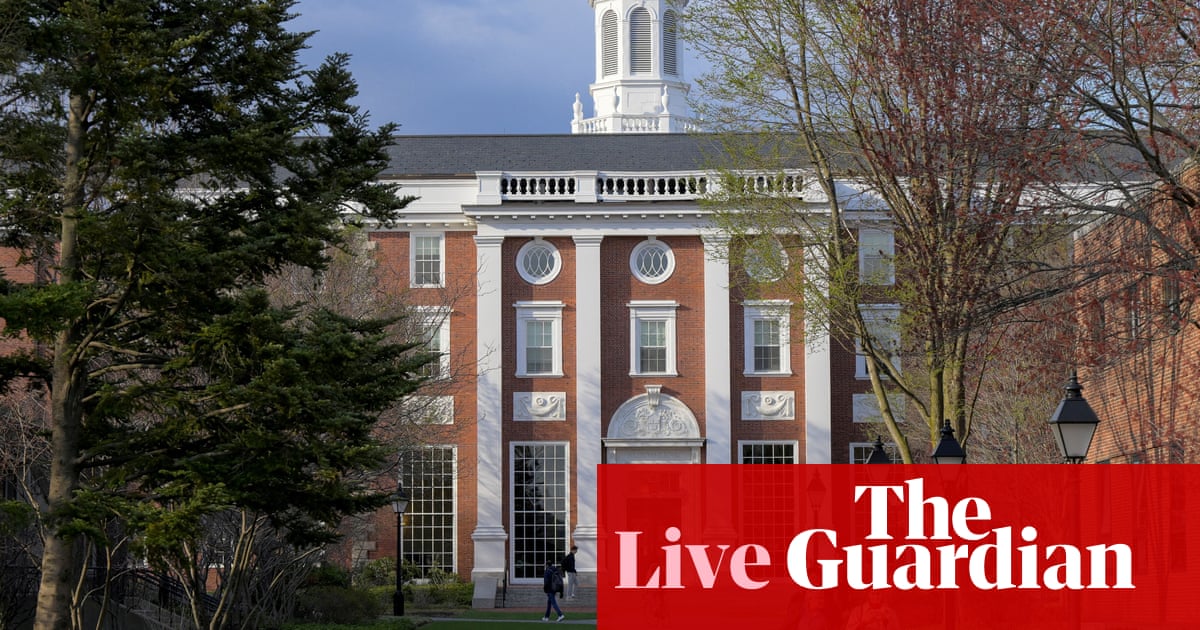Good morning and welcome to theUS politicslive blog. I’m Tom Ambrose and I will be bringing you the latest news lines over the next few hours.
The Trump administration revoked Harvard University’s ability to enroll international students in its escalating battle with the Ivy League school, saying thousands of current students must transfer to other schools or leave the country.
The Department of Homeland Security announced the action Thursday, saying Harvard has created an unsafe campus environment by allowing “anti-American, pro-terrorist agitators” to assault Jewish students on campus. It also accused Harvard of coordinating with the Chinese Communist Party, saying it hosted and trained members of a Chinese paramilitary group as recently as 2024.
“This means Harvard can no longer enroll foreign students and existing foreign students must transfer or lose their legal status,” the agency said in a statement.
Harvard enrolls almost 6,800 foreign students at its campus in Cambridge, Massachusetts, accounting for more than a quarter of its student body. Most are graduate students, coming from more than 100 countries.
It comes as China’s foreign ministry said today that it will safeguard the legitimate rights and interests of its overseas students and scholar.
US actions will undoubtedly affect its image and credibility, said Mao Ning, spokesperson for the ministry, during a regular press briefing, adding that educational cooperation between China and the US benefits both parties.
In other news:
The US justice department charged the lone suspect in a brazen attack that killed two young Israeli embassy staff members outside the Jewish museum in downtown Washington DC with murder of foreign officials and other crimes.Court documents released on Thursdaycharged Elias Rodriguez, 31, of Chicago, with the Wednesday night killings that left the US capital in shockand were condemned by world leaders as “horrible” and “antisemitic”. According to the filing, the suspect told police after his arrest: “I did it for Palestine, I did it for Gaza.”
Mahmoud Khalil, the detained Palestinian activist, was allowed to hold his one-month-old son for the first time after a federal judge blocked the Trump administration’s efforts to keep the father and infant separated by a plexiglass divider, reports the Associated Press.The visit today came ahead of a scheduled immigration hearing for Khalil, a legal permanent resident and Columbia University graduate who has been held in a Louisiana jail since 8 March.
The North Dakota governor Kelly Armstrong accidentally vetoed $35m for the state’s housing budget.When Armstrong took up an agency budget bill approved by the legislature, he thought he vetoed a couple of line items. But he vetoed millions for North Dakota’s housing budget. Now the state is figuring out how to deal with the unusual problem of a mistaken veto.
The supreme court declined to reinstate independent agency board members fired by Donald Trump.The court’s action extended an order chief justice John Roberts issued in April that had the effect of removing two board members whom Trump fired from agencies that deal with labor issues, including one with a key role for federal workers as the president aims to drastically downsize the workforce. The decision Thursday keeps on hold an appellate ruling that had temporarily reinstated Gwynne Wilcox to the National Labor Relations Board and Cathy Harris to the Merit Systems Protection Board.
Donald Trump announced on Truth Social that Bernie Navarro, the founder of the Miami lender Benworth Capital, will be the ambassador to Peru.Navarro is an ally and donor to secretary of state, Marco Rubio. Benworth was sued last year by the Federal Reserve Bank of San Francisco.
Donald Trump showed a screenshot of a Reuters video taken in the Democratic Republic of Congo as part of what he falsely presented on Wednesday as evidence of mass killings of white South Africans,Reuters itself reports.“These are all white farmers that are being buried,” said Trump, holding up a print-out of an article accompanied by the picture during a contentious Oval Office meeting with South African President Cyril Ramaphosa. In fact, the video published by Reuters on February 3 and subsequently verified by the new agency’s fact check team, showed humanitarian workers lifting body bags in the Congolese city of Goma. The image was pulled from Reuters footage shot following deadly battles with Rwanda-backed M23 rebels.
